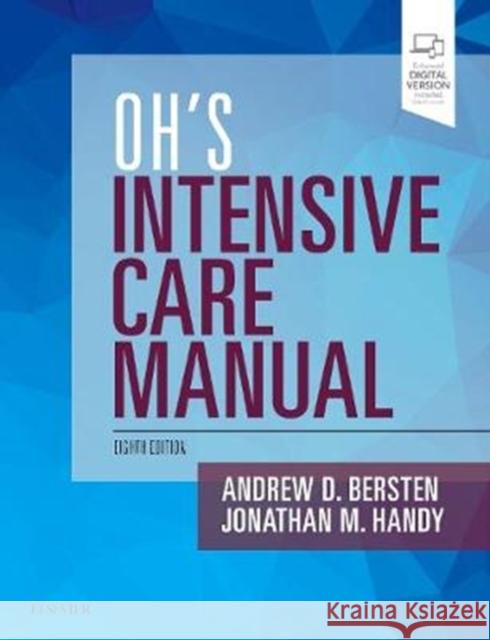Oh's Intensive Care Manual » książka



Oh's Intensive Care Manual
ISBN-13: 9780702072215 / Angielski / Miękka / 2018 / 1480 str.
Oh's Intensive Care Manual
ISBN-13: 9780702072215 / Angielski / Miękka / 2018 / 1480 str.
(netto: 404,94 VAT: 5%)
Najniższa cena z 30 dni: 420,85
ok. 30 dni roboczych.
Darmowa dostawa!
Doody's Core Titles® 2022
Doody's Core Titles® 2022 Essential Purchase
"This expansive softcover book contains over 100 chapters and nearly 1,500 pages.This edition continues a broad survey of the field."
-David J. Dries, MD (University of Minnesota Medical School) for Doody's Review Service
PART 1 - Organisation Aspects
1 - Design and organisation of intensive care units
2 - Critical care Outreach & rapid response systems
3 - Severity Scoring and Outcome Prediction
4 - Transport of the critically ill patients
5 - Physiotherapy in intensive care
6 - Critical care nursing
7 - Ethics
8 - Common problems after ICU
9 - Clinical information systems
10 - Trials
11 - Palliative care
12 - ICU and the elderly
13 - Team based health care delivery
14 - Genetics and Sepsis
PART 2 - Shock
15 - Overview of shock
16 - Haemodynamic monitoring
17 - Multi-organ dysfunction syndrome
18 - Monitoring oxygenation
19 - Hyperlactatemia in Critical Illness
PART 3 - Acute Coronary Care
20 - Acute cardiac investigations and interventions
21 - Cardiopulmonary resuscitation (including defibrillation)
22 - Cardiac arrhythmias (combine with drugs)
23 - Cardiac pacing
24 - Acute Heart failure and Pulmonary Hypertension
25 - Valvular and congenital heart disease and infective endocarditis
26 - Postoperative cardiac intensive care
27 - Echocardiography in intensive care
PART 4 - Respiratory Failure
28 - Oxygen therapy
29 - Airway management and acute airway obstruction
30 - Acute respiratory failure in chronic obstructive pulmonary disease
31 - Mechanical ventilator support
32 - Humidifiers and inhalation therapy
33 - Acute respiratory distress syndrome include fat embolism
34 - Pulmonary embolism
35 - Acute severe asthma
36 - Pneumonia
37 - Noninvasive ventilation
38 - Respiratory monitoring
39 - Chest imaging
40 - Ultrasound in the ICU
41 - ECMO
PART 5 - Gastroenterological Emergencies
42 - Acute gastrointestinal bleeding
43 - Acute pancreatitis
44 - Hepatic failure
45 - Abdominal Surgical Catastrophes
46 - Implications of solid tumours for Intensive Care
PART 6 - Acute Renal Failure
47 - Acute Kidney Injury
48 - Renal Replacement Therapy
PART 7 - Neurological Disorders
49 - Disorders of consciousness
50 - Status epilepticus
51 - Acute cerebrovascular complications
52 - Cerebral protection
53 - Brain death
54 - Meningitis and encephalomyelitis
55 - Tetanus
56 - Delirium
57 - ICU acquired weakness
58 - Neuromuscular disorders
PART 8 - Endocrine Disorders
59 - Diabetic emergencies
60 - Diabetes insipidus and other polyuric syndromes
61 - Thyroid emergencies
62 - Adrenocortical insufficiency
63 - Acute calcium disorders
PART 9 - Obstetric Emergencies
64 - Preeclampsia and eclampsia
65 - Obstetric emergencies
66 - Severe cardiac disease in pregnancy
PART 10 - Infections and Immune Disorders
67 - Anaphylaxis
68 - Host defence and immunodeficiency
69 - HIV and AIDS
70 - Sepsis and Septic shock
71 - Nosocomial infections
72 - Severe soft tissue infections
73 - Fungal infection
74 - Principles of antibiotic use in the ICU
75 - Tropical diseases
PART 11 - Severe and Multiple Trauma
76 - Severe and multiple injuries
77 - Severe head injuries
78 - Faciomaxillary and upper airway injuries
79 - Chest injuries
80 - Spinal injuries
81 - Abdominal and pelvic injuries
PART 12 - Environmental Injuries
82 - Submersion
83 - Burns
84 - Thermal disorders
85 - Electrical safety and injuries
86 - Envenomation
87 - Blast and ballistic trauma
88 - Bioterrorism
PART 13 - Pharmacologic Considerations
89 - Pharmacokinetics, pharmacodynamics and drug monitoring in acute illness
90 - Poisoning and drug intoxication
91 - Sedation and pain management in intensive care
92 - Vasopressors and inotropes
93 - Vasodilators and antihypertensives
PART 14 - Metabolic Homeostasis
94 - Acid-base balance and disorders
95 - Fluid and electrolyte therapy
96 - Enteral and parenteral nutrition
PART 15 - Haematological Management
97 - Blood transfusion
98 - Colloids and blood products
99 - Plasmapheresis, therapeutic plasma exchange and intravenous immunoglobulin therapy
100 - Haemostatic failure
101 - Haematological malignancy
PART 16 - Transplantation
102 - Organ donation
103 - Liver transplantation
104 - Heart and lung transplantation
PART 17 - Paediatric Intensive Care
105 - The critically ill child
106 - Upper airway obstruction in children
107 - Acute respiratory failure in children
108 - Paediatric fluid and electrolyte therapy
109 - Sedation and analgesia in children
110 - Shock and cardiac disease in children
111 - Neurological emergencies in children
112 - Paediatric trauma
113 - Treatment limitation and organ procurement
114 - Paediatric poisoning and envenomation
115 - Paediatric cardiopulmonary resuscitation
Dr Jonathan Handy is a top consultant anaesthetist based at Chelsea and Westminster Hospital and the Royal Marsden and serves as Honorary Senior Lecturer for University College London. He is also Clinical Lead for North West London Critical Care Network. Dr Handy is heavily involved in research, including the molecular physiology of critical illness. He is an editor for the journal 'Anaesthesia' and has been involved in developing and teaching various educational courses.
1997-2026 DolnySlask.com Agencja Internetowa
KrainaKsiazek.PL - Księgarnia Internetowa









